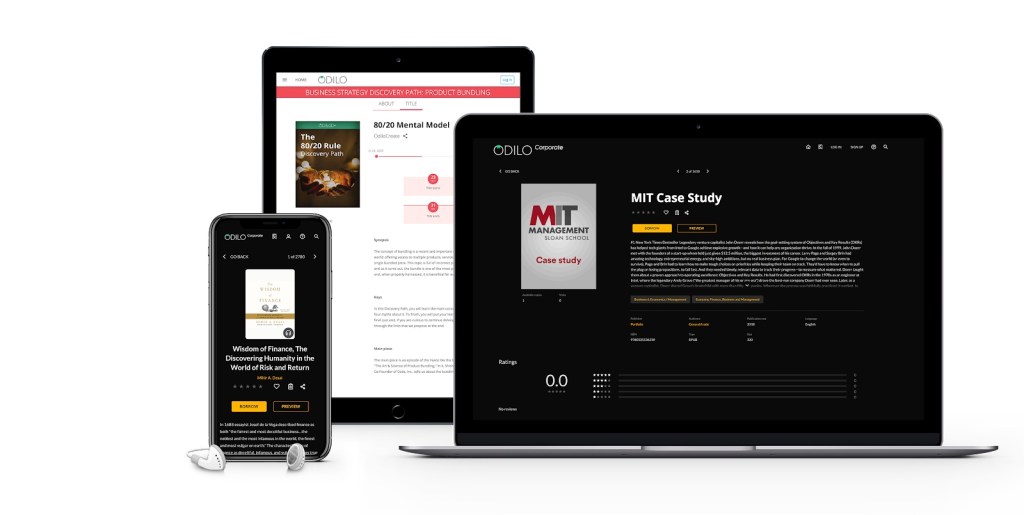E-learning — whether it’s in the form of a supplement to physical materials or live lessons; or the primary or even only medium being used — is now an indelible part of the educational experience; and now a startup out of Spain that’s built a platform to help deliver e-learning in more places is announcing a growth round of funding to expand its business further.
Odilo, a Madrid-based startup that has built a white-label platform used by businesses or organizations to build their own customized e-learning offerings in a B2B2C model, has picked up €60 million ($64 million). London investor Bregal Milestone led the round with participation from previous backers Swanlaab and CDTI. Odilo is not disclosing its valuation, but it’s been around since 2012 and had raised less than $30 million before now.
You may not be familiar with the name “Odilo.” Rodrigo Rodriguez, the founder and CEO, described Odilo to me as a “Netflix” for education because of its large catalogue — the company has so far amassed 3.9 million items, including some 3 million books but also podcasts, full courses and other materials from 6,300 publishers in 43 languages — and the fact that people dip into that content on an on-demand, use-whatever-you-want basis.
Unlike Netflix, however, it operates as a while-label service, so you may never actually see the Odilo brand. Yet there is a chance you may have used one of the education portals that it powers. Odilo has so far racked up 8,500 customers in 52 countries, covering some 170 million users in all, with the list including government bodies, libraries and education organizations like MIT, but also big corporate customers such as Google and Vodafone.
Rodriguez said that the new funding will be used to continue growing that catalogue as well as to expand deeper into more markets, specifically North America and the African continent.
The company has grown out of two significant trends in tech. The first is the rise of e-learning, which in its widest view can include both school learning as well as professional training and everything in between was estimated to be worth some $315 billion in 2021 and will grow at a CAGR of 20% for the next six years according to researchers. That whole trend, of course, was accelerated by COVID-19, when schools and other in-person learning experiences were shut down, but it was already big even before the pandemic and given the economics of virtual experiences is likely to remain in place.
The second is the rise of “headless” systems: Services that are built as extensible platforms, where customers are given the option of using a variety of APIs and other tools to build out their own customized experiences on top of them. These are very common in other areas of tech that are otherwise very complex to build from the ground up — e-commerce back ends (Shopify or Commercetools for example), content management systems (e.g., Contentful) — and now Odilo is effectively using that same model and applying it to e-learning.
(And to point out, there are others also pursuing the idea of building platforms that let others create customizable libraries of e-learning: Perlego in London has described itself as a “Spotify” of e-learning pursuing something similar and also raising money to build that out; the scale of Odilo is very impressive in that regard, though.)
It was notable to me that Google is one of Odilo’s customers: The company, one of the world’s undisputed tech giants, has made a big push into education by way of products like its collaborative multimedia Google Classroom; its Google Scholar academic material search; YouTube of course; its primary search engine and so much more. It uses Odilo to build training and education libraries for its people, Rodriguez told me, but had it ever approached Odilo to build a more consumer-facing offering?
No, was the short answer he gave me, but he did note that it’s been talking with very large technology companies that want to look at this kind of product but might not want to invest in building it themselves — not initially at least — to explore this very idea.
That, plus the existing large market, are two reasons why investors have been ready to invest, even at a time when raising money is getting a little trickier for startups.
“Odilo is an innovative player in the high-growth educational content market, with an impressive product range, a vast content catalogue and best-in-class digital infrastructure,” said Francesco Canessa, a principal at Bregal Milestone, in a statement. “There is significant scope for internationalization and scaling the platform — two value creation levers where Bregal Milestone has significant expertise. As a leader in its field with a strong, sticky customer base and a unique offering, Odilo is exactly the kind of business we look for, and we’re excited about the growth prospects ahead as we work together.”































Comment